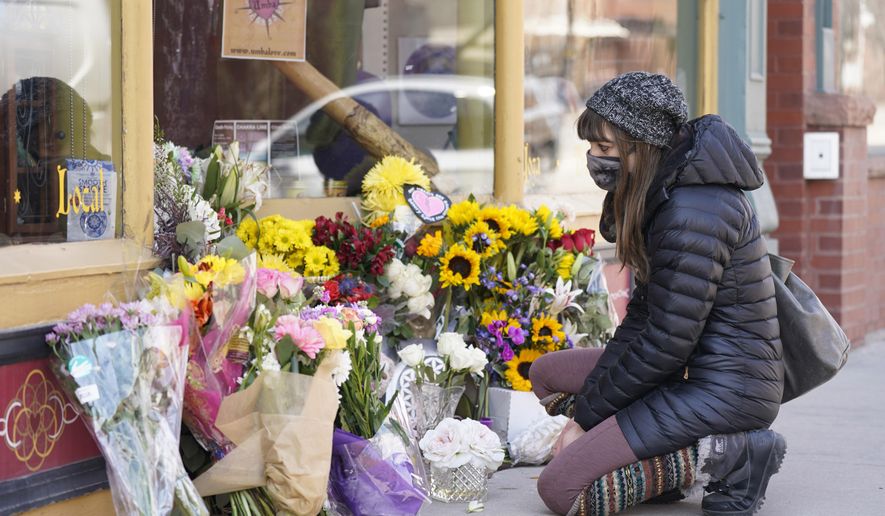The U.S. is reeling from its second mass shooting in less than a week and a city is again grieving even as the nation continues to cope with the coronavirus pandemic.
The suspect was jailed after the rampage that killed 10 people in a Colorado supermarket Monday afternoon, but many questions about what caused the shooting are still unanswered.
Here’s a look at what is known and what remains unknown:
LIVES LOST
Those slain included the owner of a local clothing shop, a man about to become a grandfather, a photographer and a Medicare agent who was also an actress.
Some victims were gunned down while picking up groceries; others were putting in a day’s work. One, Eric Talley, was a police officer who raced to the store that day to rescue people from the deadly attack.
But why the shooter opened fire at that store and whether the attack was random or targeted is unclear.
SHOOTER’S MOTIVE
The King Soopers grocery store was considered a community hub by many in the south part of Boulder, a liberal city of about 100,000 people that’s home to the University of Colorado.
But the suspect in the shooting, 21-year-old Ahmad Al Aliwi Alissa, was from the Denver suburb of Arvada, about 20 miles (32 kilometers) away. The two-story house believed to be owned by his father is in a relatively new, middle- to upper-class neighborhood.
Little has emerged about a possible motive.
His family did tell investigators they believed Alissa was suffering some type of mental illness, including delusions, according to a law enforcement official who spoke to the AP on the condition of anonymity. Alissa seemed at times to think people were following or chasing him, a possible factor in the violence, according to what relatives told the official, who was briefed on the shooting but not authorized to speak publicly.
THE WEAPON
The suspect bought the weapon believed to have been used in the shooting six days before the slayings. Authorities haven’t said where or how he purchased it. The AR-15-style gun recovered at the scene, a Ruger-AR-556, is technically a pistol but strongly resembles a rifle with a slightly shorter stock. Another handgun was recovered inside the store as well as a green tactical vest Alissa removed along with most of his clothing before his arrest.
He had been playing around with a weapon that looked like a “machine gun” about two days earlier, his sister-in-law later told police.
HIGH SCHOOL
Little is publicly known about Alissa’s daily life before Monday afternoon. A spokesman for the university he had listed on his now-deleted Facebook profile said he was not enrolled there.
A few details have emerged about his high school years in Arvada. He was a wrestler, though he was later kicked off the team after an angry tirade that followed a lost match, a former teammate told The Associated Press.
He also was convicted in 2018 of knocking a fellow student to the floor, then climbing on top of him and punching him in the head several times, according to police documents. He was sentenced to probation and community service.
Alissa complained that the student had made fun of him and called him “racial names” weeks earlier, according to the affidavit. Alissa was born in Syria, emigrated to the U.S. as a child and is now a U.S. citizen, according to two law enforcement officials who spoke to the AP on the condition of anonymity because they are not authorized to speak publicly.
GUN LAWS
A judge struck down a Boulder city ban on possessing assault weapons 10 days before the slayings. It’s likely impossible to know if it could have stopped him, but the timing was tragic for city leaders who had hoped to prevent a mass shooting of the kind that has gripped Colorado several times over the past two decades.
The state does have a law allowing firearms to be taken from people who pose a danger. Family, household members or law enforcement can petition a judge under the measure known as an extreme risk protection order or “red flag law.”
It’s unclear whether anyone close to Alissa was concerned enough about his behavior to begin the court process over the past week. Still, convincing a judge that weapons need to be seized or surrendered typically requires evidence of an imminent threat, said Jacob Charles, executive director at the Duke Center for Firearms Law. Considering the importance of Second Amendment rights, general concerns about someone acting odd and having a weapon is typically not enough, he said.
__
Associated Press writer Colleen Long in Washington, D.C. contributed to this report.




Please read our comment policy before commenting.